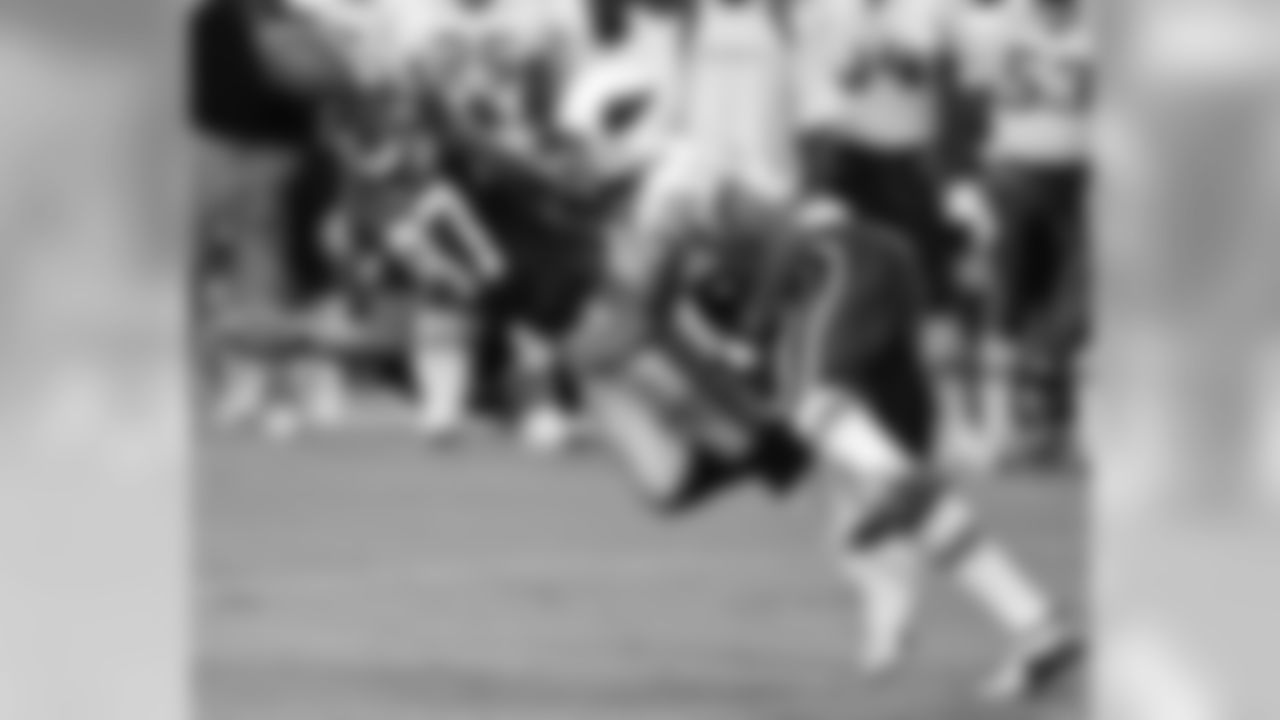The San Diego Chargers had just beaten the then-Phoenix Cardinals on a December afternoon in 1992 when veteran Chargers cornerback Gill Byrd was approached by the Cardinals up-and-coming star, Aeneas Williams.
Williams had a simple request. He wanted to meet with Byrd, to pick his brain about playing the position of cornerback. Truth be told, Byrd was surprised. There were young defensive backs in his own locker room that had no desire to tap into Byrd's knowledge. But Byrd was happy to oblige.
"Just give me a call," Byrd told Williams.
Of course, the two had just played a game. It wasn't as if they had a Sharpie tucked in their uniform, so there was no way to give Williams a number. Nevertheless, one day in the offseason, Byrd got a call from Williams looking to set up a working visit to San Diego.
"That just showed the type of person he was," Byrd said. "So young, but he just always had the end in mind. He knows what he has to do. The end for him was to be the best at his position. The Hall of Fame was the end. Prior to that, he did everything he needed to do to get him to the end."
Williams' journey to the Pro Football Hall of Fame ends Saturday, when he is officially inducted in Canton. Williams will be presented by his father Lawrence, and joins six other Hall newcomers: Raiders punter Ray Guy, Bills wide receiver Andre Reed, Giants defensive end Michael Strahan, Buccaneers linebacker Derrick Brooks, Seahawks tackle Walter Jones and Falcons/Eagles defensive end Claude Humphrey.
Williams played the first 10 of his 14-year career with the Cardinals, after the team made him its third-round pick in 1991. He is the first Cardinal who played in Arizona – where the team moved in 1988 -- to make the Hall of Fame.
"When I grew up the Cardinals were the St. Louis Cardinals," said former Cardinals linebacker Eric Hill, who joined the team in 1989. "It's very important, and very significant, to have an Arizona Cardinal in the Hall of Fame."
Williams, a Southern University product, made the Pro Bowl eight times in his career, six times during his decade with the Cardinals and another two times after moving to the Rams. The NFL players association named Williams the NFL defensive rookie of the year in 1991, and he was named to the NFL's All-Decade team of the 1990s.
"I had written down I wanted to be one of the best cornerbacks to play in the National Football League," Williams said. "When you have a goal like that, I did it because it was in my heart to do it and I wrote it down. It wasn't intimidated (by the league) even though I didn't know the possibilities of it happening."
Byrd wasn't the only veteran defensive back Williams reached out to, but Williams didn't develop any closer friendship than he did with Byrd. Williams and his wife, Tracy, would visit San Diego and spend time with Byrd and his wife, Marilyn. Football wasn't the only topic of conversation. Williams became someone for Byrd's kids – including Jarius, who has grown into a Pro Bowl safety now playing for the Saints – to emulate.
But it was football that first drew Williams to Byrd and why they needed to talk.
"Gill taught me how to study film, taught me the philosophy of a great cornerback and he really played a huge part in me becoming the player I became," Williams said.
Byrd said Williams always has been humble despite being asked to line up against the opposition's best wideout week after week. Williams never felt he was so good that he wouldn't ask for advice to improve his game.
That was the kind of personality upon which Williams built his career.
"He was a great human being first," Hill said. "On a team you have 53 guys and 53 personalities, but he was one of those special guys. You knew what you were going to get every day. His work ethic, from a football standpoint, was second to none."
Byrd often tells his sons that it costs nothing to listen to people, comparing advice to a T-bone steak.
"You don't eat the fat, don't eat the bone, but you eat the meat," Byrd said. "That's just like a conversation you have to get information. Some of the things I said to Aeneas were like fat and bone. But there were some things he took and he chewed, he ate, he digested and he got better with it. I know I'm not the only one he asked questions of or sought out. That's just the type of person he is."
Williams finished his career with 55 interceptions with nine returned for touchdowns. With the Cardinals, he started 159 of 160 games played, and his 46 interceptions while in Arizona rank second in franchise history. He collected 629 tackles, two sacks and 10 forced fumbles. He was inducted into the Cardinals' Ring of Honor in 2008.
Williams refers to Byrd as his mentor, but Byrd – now the defensive backs coach for the Buccaneers – chuckles at such a designation.
"I never felt it was a mentor thing," Byrd said. "I probably learned more from Aeneas during those years than he probably learned from me. I think it's through his humility that he says I was the mentor, but no. I learned from Aeneas Williams as well."
When Williams played for the Cardinals, the team lived in the NFC East. And in those years, it was the division brethren Dallas Cowboys who were NFL dominant. That's what Hill remembers when asked about Williams – because the twice-yearly showdowns between Williams and future Hall of Fame wide receiver Michael Irvin were the stuff of legend.
"That was a sight to see – Aeneas Williams when he lined up against Michael Irvin," Hill said. "He frustrated Michael Irvin more than anyone else. What he did to Michael the second half of Michael's career wasn't fair. Aeneas was his nemesis."!
Irvin, laughing at the memory, said he stretched the rules trying to get under Williams' skin.
"The things I did," Irvin said. "Beating on him. Grabbing his facemask. I tried to rile him up. Instead he'd just look at me and say, 'I'm right here.' We had such respect for each other. He would give you all he had and he would do it in the classiest way you could."
Darrell Green was the transcendent cornerback when Irvin came into the league. Deion Sanders reached the same level soon after but Williams deserved to be in the conversation with both, Irvin said. Never did the matchup feel more lopsided than in the Cardinals' memorable 20-7 playoff win in Dallas during the 1998 season – the lone postseason win of Williams' tenure in Arizona.
Irvin had just four catches for 32 yards, while Williams came down with two interceptions in the historic victory. When asked about a signature moment in his career, Williams points to that that game, and that matchup.
"Having the game I had against Michael Irvin," Williams said. "I'll never forget it."
Irvin, too, will never forget his clashes with Williams.
"I watched Aeneas mature and go from one of the young guys to the guy saying, 'I'm taking everybody on.' " Irvin said. "When you look at Aeneas, his incredible story, and how he was locking down guys, he did an incredible job.
"He was a fighter, he worked hard, and he was a great teammate. You don't run into anyone who says anything bad about Aeneas Williams."
Hill was Williams' teammate for seven seasons. In those seven years, the Cardinals won only 38 games, and Hill admits he wasn't sure Williams would reach Canton not because he wasn't good enough but because his teams weren't good enough.
"The unfortunate thing about playing out in Arizona during the lean years, I don't think everyone got a good understanding of how good he was on the football field or a sense of how great a person he was off the football field," said quarterback Kurt Warner, who was later Williams' teammate in St. Louis. "I watched him from afar and had an idea of how good he was but never knew that much about him until I got to spend some time with him. I was always hoping he wouldn't get overlooked because they didn't have a lot of success when he was here, so this is just. He deserves to be in the Hall of Fame."
If there is anything Williams emphasizes, however, it is that the losing – while difficult – never stole from him the joy of playing in the NFL or striving to be great.
"I've always been able to keep things in proper perspective," Williams said. "Out of all high school football players, over a million, only one percent make it to the NFL. I would never allow the wins and losses to cause me to have any disparaging thoughts about the opportunity I was afforded."
Williams didn't know a lot about Arizona when he was first drafted. He does remember then-General Manager Larry Wilson proclaiming that he would be the Cardinals' top cornerback for the next decade. It isn't lost on Williams he played for the Cards for exactly 10 seasons.
"There are so many memorable moments," Williams said.
Images of former Cardinals CB Aeneas Williams, who was inducted into the Pro Football Hall of Fame on Saturday.

Aeneas Williams honored at the Super Bowl on Sunday.

Aeneas Williams after his interception in the 1998 NFC Wild Card game against the Cowboys.

Aeneas Williams covers Lions WR Herman Moore.

Aeneas Williams walking off the field with WR Frank Sanders.

Aeneas Williams picks off a pass in front of Cris Carter.

Aeneas Williams getting a breather.

Aeneas Williams at his Cardinals' Ring of Honor induction in 2008.

Aeneas Williams during his Cardinals' career.

Aeneas Williams tackles 49ers WR Jerry Rice.

Aeneas Williams hauls in an interception as Michael Irvin looks on.

Aeneas Williams hugs Eagles QB Donovan McNabb.

Aeneas Williams defends a pass intended for Seattle's Derrick Mays.

Aeneas Williams returns a fumble 104 yards for a touchdown.

Aeneas Williams leaps for Cowboys WR Michael Irvin.

Aeneas Williams peers in at the line of scrimmage.

Aeneas Williams at a game at Sun Devil Stadium.

Aeneas Williams tries to bring down Redskins WR Michael Westbrook.

Aeneas Williams prepares for a play.

Aeneas Williams takes a break in a game against the Redskins in 1996.

Aeneas Williams readies for a play.

Aeneas Williams celebrating.
That included winning a NFC Defensive Player of the Year award. It included working with coaches like Jim Johnson and Buddy and Rob Ryan, the latter of which told Williams he could lead the league in interceptions and then he did with nine in 1994. But nothing sticks with Williams like the 1998 season, when the Cardinals not only had a winning record for the first time with Williams on the team but made the playoffs and beat the Cowboys.
The Cardinals put the franchise tag on Williams after his contract expired following the 2000 season. Williams considered retirement before the Cardinals finally dealt him to the St. Louis Rams for a pair of draft picks. Williams, who eventually moved to safety, went on to start for the Rams in the Super Bowl in the 2001 season. That part of his career helped his Hall of Fame candidacy.
"My friend Cris Carter says, 'When they say the Hall of Fame, they're saying they can't tell the history of the NFL without including you,' " Williams said.
They certainly can't tell the history of the Cardinals without him, just like Williams can't tell his own story without the Cardinals.
"People talk about the wins and losses, and we didn't win a lot of games, but man, to be there when we were able to cross that hurdle in 1998 and be there and make the playoffs and upset Dallas, it really showed me if there was ever a consistent program of winning, that the city was well prepared to back the team," Williams said. "When I go back and see the stadium and see the support and the home-field advantage they now have, I am not surprised at all.
"Those fans, at Sun Devil Stadium, coming out, I'll never forget it. The Bidwill family believed in me. I signed three contracts there and I enjoyed my time there."














